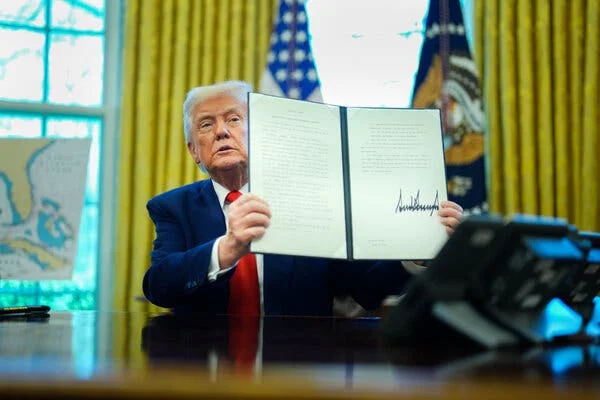
Trump Wages War On Dissenters With Orders Targeting Ex-Officials And Law Firm
In a striking escalation of political retaliation, President Donald Trump this week signed a series of memorandums and executive orders aimed squarely at two former senior officials—Miles Taylor and Chris Krebs—who pushed back against his persistent claims of election fraud, highlighting the deepening tensions over free speech, government authority, and dissent in American democracy.

The orders, signed Wednesday in the Oval Office and witnessed by key Cabinet members, mark an extraordinary use of presidential power directed against critics within the national security apparatus. Critics say they also send a chilling message to those challenging the president’s narrative or exposing uncomfortable truths.
Miles Taylor, who famously penned the anonymous 2018 op-ed proclaiming himself part of an internal resistance during Trump’s first term, is accused by the president of leaking sensitive information and ‘treasonous’ behavior. Trump stripped Taylor of any security clearance and directed the Justice Department to investigate him, questioning whether dissent from within equates to betrayal. Taylor, now publicly named, swiftly fired back on social media, arguing, “Dissent isn’t unlawful. It certainly isn’t treasonous. America is headed down a dark path.” He warned all Americans should worry about their freedoms if criticism itself becomes criminalized.
Equally targeted was Chris Krebs, the respected cybersecurity official who led the agency responsible for safeguarding the 2020 election and who publicly debunked Trump’s baseless fraud claims. After sacking Krebs in 2020, Trump renewed his attack this week, accusing him of ‘weaponizing’ his authority by allegedly suppressing narratives critical of the establishment—particularly regarding election integrity and COVID-19 information. Formal memoranda now order agencies to revoke Krebs’ security clearance and investigate his conduct, while outlining a wholesale review of his former agency’s activities over six years for potential censorship violations.
Concurrently, Trump directed similar punitive measures against Susman Godfrey—the law firm that represented Dominion Voting Systems in its $787.5 million defamation victory over Fox News. The firm’s success exposed networks’ spreading of election falsehoods, further enraging Trump as he seeks to rewrite 2020’s contested history and punish those, legal or official, who challenged his narrative.
Analysts link this sweeping campaign to Trump’s public vow of ‘retribution’ against perceived enemies and disloyal voices. The aggressive moves blur traditional lines separating policy from personal vendetta and raise profound concerns about weaponizing federal law enforcement against dissent. Critics warn it corrodes civil liberties, while supporters argue it confronts what they view as deep-state sabotage.
Central in Trump’s rhetoric is his insistence that the 2020 election was ‘badly rigged,’ claims uniformly rejected by courts and election officials. Yet, by revoking clearances and ordering investigations, Trump is cementing an alternative framework, portraying critics like Krebs as ‘frauds’ rather than patriots safeguarding democracy.
Alongside the retributive orders, Trump signed directives on issues like revitalizing U.S. shipbuilding and deregulating household appliance water flow. Yet it is his crackdown on dissenters that overshadows these initiatives, signaling a turbulent chapter in American politics ahead.
This unprecedented pursuit of former officials and legal adversaries raises urgent questions: will dissent be criminalized further? Is debate within government now tantamount to betrayal? And, fundamentally, what does this mean for future whistleblowers or those willing to stand against power?
As the nation digests this extraordinary display, one thing is clear—the battle over America’s democratic soul and the right to disagree is far from over. Readers, what are your thoughts on this unprecedented move? Join the conversation by leaving your comments and sharing your perspectives below.